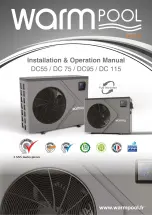
-UTSM-12
82
5. Installation of Connective Pipe
5.1 Preparation before Installation
Check the height difference between the indoor unit and the outdoor unit, and check the length and number of
bends of the refrigerant pipeline, which must meet the following requirements:
Max. Height difference....30m (If the height difference is greater than 5m, it is better to put the outdoor unit
above the indoor unit).
Max. Pipeline length.........50m.
Max. Number of bends....15.
In the process of installing the connective pipe, do not lemmas the air, dust or foreign substance intrudes
into the pipeline system.
Install the connective pipe only after fixing the indoor and outdoor units.
Keep dry when installing the connective pipe. Do not let moist intrude into the pipeline system.
5.2 Procedure of Connecting Pipes
5.2.1 Measure the required length of the connective pipe, and make the connective pipes in the
following procedure.
5.2.1.1
Connect the indoor unit first, and then connect the outdoor unit.
The pipe bend should be handled carefully, without damaging the pipe.
NOTE:
1.
Before screwing up the flared nut, apply refrigerant oil at the outer surface of the pipeline flare and the taper surface of the
connection nut. Screw up the nut for 3~4 circles beforehand.
2.
When connecting or disconnecting the pipeline, be sure to use two spanners concurrently.
3.
Do not rest the weight of the connective pipe on the adapter of the indoor unit. Too heavy load on the adapter of the indoor unit
may deform the pipe and thus affect the cooling/heating effect.
5.2.1.2
The valve of the outdoor unit should be closed completely (as in the factory status). Every time when
connecting the pipe, screw off the nut at the valve, and connect the flared pipe (within 5 minutes). If the nut is
put away for a long time after being screwed off the valve, dust and other foreign substance may intrude into
the pipeline system and lead to fault. Before connecting the pipe, use the refrigerant to expel air out of the pipe.
5.2.1.3
After the refrigerant pipe is connected to the indoor and outdoor units, expel air as instructed in the
“Expel air” section. After expelling the air, screw up the nut at the maintenance orifice.
5.2.1.4
. Precautions for the flexible part of the pipeline
The bend angle shall not exceed 90°.
The bend shall be preferably in the middle of the pipe length, and higher bend radiuses are preferred. Do not
bend the flexible pipe for over 3 times.
5.2.1.5
Bend the thin-wall connective pipe
When bending the pipe, cut out a notch of the desired size at the bend of the adiabatic pipe, and then expose
the pipe (wrap the pipe with the wrapping tape after bending it).
The radio of the elbow pipe should be as large as possible to prevent flattening or crush.
Use the pipe bender to make close elbow pipe.
5.2.1.6
Use purchased copper pipe
When the cooper pipe is purchased from the market, be sure to use the heat insulation materials of the same
type (with a thickness of over 9mm).
Summary of Contents for MDFA-76CRN2
Page 7: ...MCAC UTSM 12 8 3 Dimensions 3 1 MDTA 76C H RN2 MDTA 96C H RN2...
Page 8: ...MCAC UTSM 12 9 3 2 MDTA 120C H RN2...
Page 11: ...MCAC UTSM 12 12 6 Wiring Diagrams 6 1 MDTA 76CRN2 MDTA 96CRN2...
Page 12: ...MCAC UTSM 12 13 6 2 MDTA 76HRN2 MDTA 96HN2 6 3 MDTA 120CRN2...
Page 13: ...MCAC UTSM 12 14 6 4 MDTA 120HRN2...
Page 36: ...MCAC UTSM 12 37 6 Wiring Diagrams 6 1 MDFA 76CRN2 MDFA 96CRN2 CN20 CN20 CN20...
Page 37: ...MCAC UTSM 12 38 6 2 MDFA 76HRN2 MDFA 96HRN2 CN20 CN20 CN20...
Page 51: ...MCAC UTSM 12 53 2 Dimension 2 1 MDOV 76C H CN2 MDOV 96C H CN2...
Page 52: ...MCAC UTSM 12 54 2 2 MDOV 120C H CN2...
Page 55: ...MCAC UTSM 12 57 4 Wiring Diagrams 4 1 MDOV 76C CN2 MDOV 96C CN2 MDOV 120C CN2...
Page 56: ...MCAC UTSM 12 58 4 2 MDOV 76H CN2 MDOV 96H CN2 MDOV 120H CN2...
Page 87: ...UTSM 12 90 Floor standing type cooling and heating type 76 kBtu h 96 kBtu h...










































